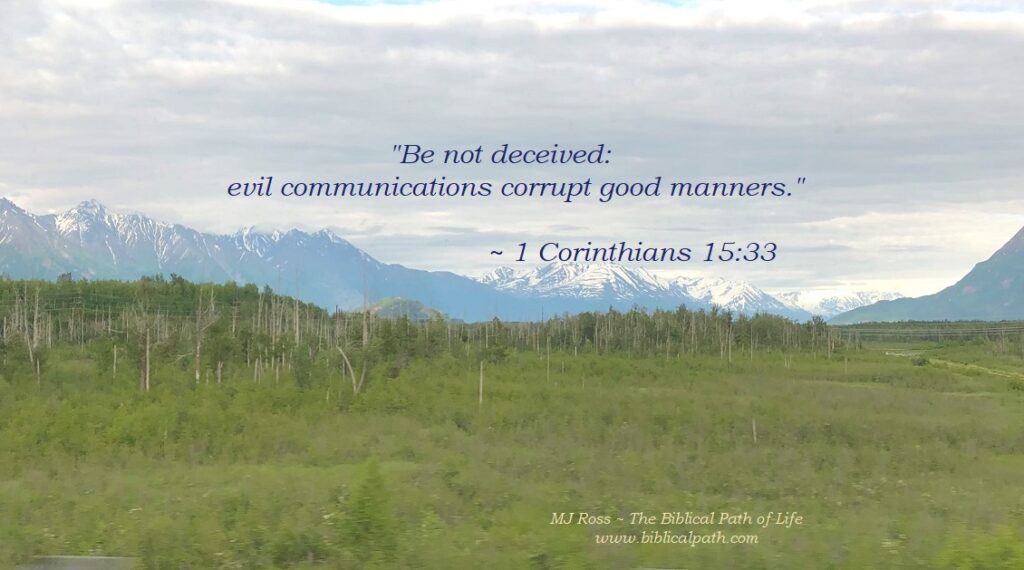
John 3:19
While living in the garden and tending it, God gave only one command to Adam and Eve – do not eat of the fruit of one particular tree in the garden. “16. And the LORD God commanded the man, saying, Of every tree of the garden thou mayest freely eat: 17. But of the tree of the knowledge of good and evil, thou shalt not eat of it: for in the day that thou eatest thereof thou shalt surely die” (Genesis 2:16-17).
Satan then entered the picture in the form of a serpent. “Now the serpent was more subtil than any beast of the field which the LORD God had made. And he said unto the woman, Yea, hath God said, Ye shall not eat of every tree of the garden?” (Genesis 3:1). Satan came to Eve under the guise of a serpent, and he challenged God’s Word as he spoke to Eve. He omitted some of the Word of God – just a couple of words. He questioned the Word of God. “And when the woman saw that the tree was good for food, and that it was pleasant to the eyes, and a tree to be desired to make one wise, she took of the fruit thereof, and did eat, and gave also unto her husband with her; and he did eat” (Genesis 3:6). Eve did not trust God’s Word. Eve was deceived. She took of the fruit of the tree of the knowledge of good and evil, and then gave it to Adam who was not deceived, but took of it willingly. “And Adam was not deceived, but the woman being deceived was in the transgression” (1 Timothy 2:14). They chose to disobey God. (Remember Proverbs 3:5-6.)
When man disobeyed God’s command, it separated them from God. “Wherefore, as by one man sin entered into the world, and death by sin; and so death passed upon all men, for that all have sinned” (Romans 5:12). It was then that their eyes were opened. “And the eyes of them both were opened, and they knew that they were naked; and they sewed fig leaves together, and made themselves aprons” (Genesis 3:7). They recognized they had sinned. Because of that sin, there was immediate separation from God. When man disobeyed God (sinned), his spirit was changed. Remember that before, Adam and Eve met with God in the cool of the day. “And they heard the voice of the LORD God walking in the garden in the cool of the day: and Adam and his wife hid themselves from the presence of the LORD God amongst the trees of the garden” (Genesis 3:8). Now, Adam and Eve hid from God. When confronted with their disobedience, they could have confessed their sin. Instead, they passed the blame – made excuses (see Genesis 3:9-13).
Because they sinned, they hid from God. They now loved evil more than righteousness. “19. And this is the condemnation, that light is come into the world, and men loved darkness rather than light, because their deeds were evil. 20. For every one that doeth evil hateth the light, neither cometh to the light, lest his deeds should be reproved.” (John 3:19-20). Man was no longer perfect as when God created him. No longer innocent. They died spiritually. Man no longer possessed the same God-like character.
After God cursed the serpent (Satan), God gave a warning and a promise of hope to all of mankind. “And I will put enmity between thee and the woman, and between thy seed and her seed; it shall bruise thy head, and thou shalt bruise his heel” (Genesis 3:15). There would be a constant conflict between Satan and mankind – forever. Nevertheless, God promised that the war was won from this point. For He promised to send One to deliver mankind from Satan and the punishment for sin (death: see Romans 6:23) forever. God promised to send His Son, Jesus. Jesus came and defeated Satan.
Although God cast them out of the Garden of Eden, remember God gave the promise of redemption through Jesus. “Being justified freely by his grace through the redemption that is in Christ Jesus” (Romans 3:24).
Do you love the darkness or the light?

